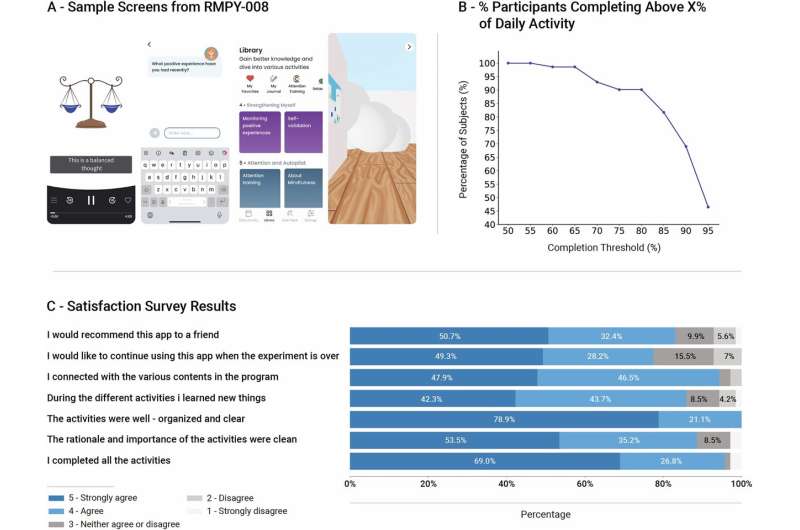Research shows RMPY-008 delivers a structured digital protocol that combines evidence-based psychological interventions with neuroscience-informed sensory modulation. The study is published in the journal npj Digital Medicine.
“As a brain plasticity researcher, I’m struck by how quickly we saw connectivity changes in critical networks like the insula, a key brain area modulating the immune system, and prefrontal cortex circuit,” said Prof. Amir Amedi, The School of Psychology and School of Medicine at Reichman University and the principal investigator of the study.
“Even more importantly, these connectivity changes were correlated with the emotional and immune improvements, which shows the power of such multisensory digital interventions to retrain the brain and body.”
In a randomized controlled study of 103 participants aged 50–65, RMPY-008:
- Reduced depression and anxiety scores and improved resilience and well-being;
- Decreased levels of key pro-inflammatory immune mediators: TNF-α, IL-17, IL-23, IL-12, IFN-γ, and MCP-1, indicating a potential coordinated immune response. These immune markers are known to play roles in mood disorders and in neurodegenerative diseases such as Alzheimer’s disease;
- Strengthened resting-state connectivity in the fronto-limbic network, especially the insula and prefrontal cortex—areas central to emotion regulation and immune modulation;
- Showed a significant correlation between brain connectivity changes and immune changes—a significant association between increased resting state functional connectivity of the right insula seed and medial prefrontal cortex and reduced IL-23, IL-17 and TNF-α pro-inflammatory cytokine levels;
- Showed a significant correlation between brain connectivity changes and psychological improvements—significant association between resting state functional connectivity of the right insula seed and key prefrontal areas (mPFC, ACC, and dlPFC) and improvement in depression, well-being and resilience scores;
- Exhibited sustained clinical benefit—the trial also included a three-week follow-up period, during which benefits were sustained with only twice-weekly use;
- Achieved high adherence and engagement—participants using the app showed 94% adherence, and more than 90% completed over 80% of daily sessions.

This large-scale study builds on earlier results of a pilot study published in Scientific Reports, where the same research team demonstrated that virtual navigation training improved emotional well-being and altered brain connectivity in individuals with SCD, alongside reductions in salivary IL-18 and default mode-salience network interplay.
The implications of the studies extend well beyond cognitive health. Because chronic stress and inflammation are known to negatively impact a wide range of medical conditions—including cardiovascular diseases, autoimmune disorders, metabolic syndrome, cancer, and neurodegenerative illnesses—the demonstrated ability of RMPY-008 to reduce inflammation and improve emotional regulation suggests broader clinical utility.
“As part of our Hybrid Drug development strategy, we first validate stand-alone digital interventions and then combine them with target pharmacological treatments,” said Dr. Michal Tsur and Or Shoval, co-founders and co-CEOs of Remepy.
“The results from RMPY-008, across mental, brain and immune systems serve as a foundation for our Hybrid Drug clinical pipeline—in Parkinson’s disease, fertility, oncology, and immunology. This is much more than an app—it is a digital antibody.”
More information:
Merav Catalogna et al, Mobile application leads to psychological improvement and correlated neuroimmune function change in subjective cognitive decline, npj Digital Medicine (2025). DOI: 10.1038/s41746-025-01765-1
Citation:
Digital protocol links brain connectivity changes to improved mood and lower inflammation (2025, June 26)
retrieved 26 June 2025
from https://medicalxpress.com/news/2025-06-digital-protocol-links-brain-mood.html
This document is subject to copyright. Apart from any fair dealing for the purpose of private study or research, no
part may be reproduced without the written permission. The content is provided for information purposes only.

